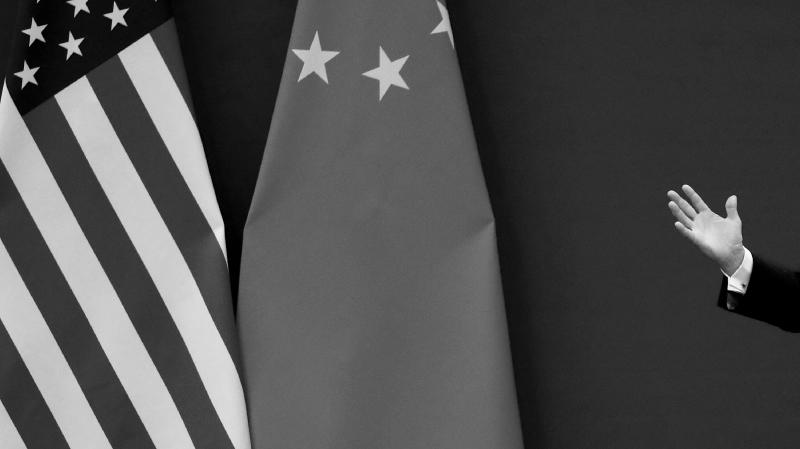Here's How Trump Could Lose the Coming Trade War


Economic conflict is coming.
He is utterly unsuited to manage it.

Wherein Paul agrees with Donald.
No, not really.


The good news: I don’t think Donald Trump will cause a global trade war.
The bad news: The reason I say that is I believe that a trade war would be coming even if Trump had lost the election, largely because China is refusing to act like a responsible economic superpower. Unfortunately, Trump may be the worst possible person to guide U.S. policy through the turmoil that’s probably ahead.
He won’t be the reason we have a trade war, but he may well be the reason we lose it.
China is the greatest economic success story in history. It used to be very poor; there are still many people alive who remember the great famine of 1959-61. But after the reforms that began in 1978 its economy soared. Even now, China is only a middle-income country, with G.D.P. per capita substantially lower than ours or in Western Europe. But China has a huge population, so by some measures it is now the world’s largest economy.
However, all indications are that China’s era of torrid economic growth is behind it. For decades, Chinese growth was fueled mainly by two things: a rising working-age population and rapid productivity growth driven by borrowed technology. But the working-age population peaked around a decade ago and is now falling. And despite some impressive achievements, the overall rate of technological progress in China, which economists measure by looking at “total factor productivity,” appears to have slowed to a crawl.
But a growth slowdown doesn’t have to be a catastrophe. Japan went through a similar demographic and technological downshift in the 1990s and has, on the whole, handled it fairly gracefully, avoiding mass unemployment and social unrest.
China, however, has built an economic system designed for the high-growth era — a system that suppresses consumer spending and encourages very high rates of investment.
The answer seems obvious: redistribute income to households and reorient the economy away from investment toward consumption. But for whatever reason, China’s government seems unwilling to move in that direction. Again and again, stimulus policies have been aimed more at expanding productive capacity than at empowering consumers to make use of that capacity.
So what do you do if you have lots of capacity but your consumers can’t or won’t buy what you make? You try to export the problem, keeping the economy humming by running huge trade surpluses.
And I mean huge. Tellingly, China seems to be playing games with its trade numbers in an attempt to make its surpluses look smaller than they really are. But China appears to be exporting close to $1 trillion more than it imports, and the trend is upward.
Hence the coming trade war. The rest of the world won’t passively accept Chinese surpluses on that scale. The “China shock” of the 2000s taught us that whatever the (real) virtues of free trade, a huge import surge does unacceptable damage to workers and communities in its path. Furthermore, China is an autocracy that doesn’t share democratic values. Allowing it to dominate strategically crucial industries is an unacceptable risk.
That’s why the Biden administration has been quietly pursuing a quite hard line on China, retaining Trump’s tariffs and trying to limit its progress in advanced technologies. It’s why the European Union has imposed high tariffs on electric vehicles made in China, which is probably only the beginning of expanded trade conflict.
So the trade war is coming; in some ways it has already started. What will Trump add to the story?
Ignorance, lack of focus and potential cronyism. Oh, and gullibility.
Ignorance: Trump’s insistence that tariffs don’t hurt consumers — even as businesses across America are planning to raise prices when his planned tariffs hit — strongly suggests that neither he nor anyone he listens to understands how global trade works. Not a good thing at a time of trade conflict.
Lack of focus: By proposing tariffs across the board, not on just China, Trump will raise costs for many American businesses and alienate allies who should be part of a cooperative response.
Cronyism: The president has great discretion in granting tariff exemptions to selected companies. During Trump’s first term, such exemptions went disproportionately to companies with Republican political connections. It’s naïve to think this isn’t likely to happen again, and on a much larger scale.
Finally, gullibility: During his first term, Trump eventually stopped raising tariffs after signing what he called a “historic trade deal” in which China agreed to buy $200 billion in American goods. How much of that total did China actually buy? None.
As I said, serious trade conflict is coming as China tries to export its policy failures. But America just elected perhaps the worst possible leader to manage that conflict.
Whatever





See?
Now repeat: "Tariffs good! Tariffs good! Tariffs good! Tariffs good! Tariffs good!"
You know how in fiction, the protagonist never loses? You know the story, the protagonist faces monumental challenges but no matter what is thrown at them, they always prevail. This is because the author chooses that story, no matter how unbelievable a narrative, so facts and reality don't matter. It doesn't matter how supposedly "Impossible" the mission is, Tom Cruise always wins in the end because its scripted. So, no matter what the critics say, no matter how improbable or impossible the task is, the protagonist always wins, facts and physics be damned. That is how Trump has lived his life. He writes his own narrative and when facts or reality contradict his version of events, he just continues to repeat his narrative and his loyal sycophants mindlessly repeat it which in their minds can turn fiction into reality. So, no matter how the trade wars or the proposed tariffs turn out, Trump will declare victory, facts and reality be damned.
Good take.
And since history is written by the winners, we now know that the greatest President in American history was Donald Trump.
the author weaves a biased narrative with contrived facts to create the illusion of plausibility? The presented narrative depends upon an anti-business bias using contrived facts to present a rather phony moralizing conclusion.
Donald Trump really is a businessman that really does conduct business in countries around the world. Donald Trump really does compete in the global economy. How does Paul Krugman compete in the global economy? What does Paul Krugman know about running an international business? What has Paul Krugman risked?
The World Trade Organization regulates global trade with customs duties and tariffs. So, if WTO agrees with Trump's tariffs would that be different? Does Krugman only require autocratic institutional approval before agreeing with a policy? If unelected technocrats impose tariffs to punish business then it must be good policy?
Paul Krugman is desperately trying to sound like a European intellectual but just can't pull off the deadpan irony.
China is the greatest economic success story in history -- measured in US dollars. That's the part Krugman and European intellectuals always ignore. The United States provides the gold standard for measuring economic success. The global trade war is all about access to American consumers. Without access to the American market, the global economy withers, falters, and slips into depression.
No one consumes more than the American consumer. Crazy American consumers will buy anything. In fact, American consumers have, themselves, become an exploitable commodity that is openly traded for profit. China's economic success depends entirely upon access to the American consumer while Krugman and European intellectuals act as parasitic middlemen to scrape an unearned share.
Tariffs closing off access to American consumers means the global economy suffers. But American consumers need not suffer. Taxes can be reduced on US manufacturing to lower domestic prices; offsetting the impact of tariffs. And US manufacturing selling directly to consumers (like Tesla does) denies parasitic middlemen an opportunity to scrape a share for themselves. That's how the United States dominated the export markets and became the gold standard of economic success -- before parasitic middlemen like Krugman and European intellectuals killed the golden goose to make a quick nickel.